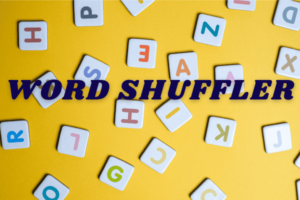Shuffled Letters
Shuffled Words
Table of Contents
What is a Word Shuffler?
To shuffle a word is to rearrange its letters or change the order of words in a sentence or phrase. Depending on context this term can have several meanings:
- Shuffling Letters within a Word: This means changing the composition of a word such that its letters appear differently, leading to an entirely new sequence sometimes even completely meaningless word such as shuffling “hello” into “loleh” or “lleho”
- Shuffling Words within a Sentence: This involves altering the order of words in sentence which may lead to change in meaning some times construction of incomprehensible sentence like if we were to shuffle ‘I like reading books’ it would be ‘reading I books like’.

Why would you shuffle letters:
This may sound like just a game, but it is not all since there are real-life applications also in it. One of the key ideas commonly used by teachers is the idea of the shuffling of the letters, which is helpful in the spelling and in the recognition of the certain words.
For instance, let’s assume that you are studying a new language just like English; well now, if you are writing the word ‘cat’, use of shuffling of these letters can assist enhance the memory plus the structure of the word in question. And I can recall when I was taking French lessons; I use to switch around the letters of words such as “chocolat” (Chocolate). This process helped in breaking the learning process and make it less boring and more enjoyable.
Swapping of Words in a Sentence
But let us extend this argument further into a new realm. Well don’t just rearrange the letters in a word; what if we rearrange words in a particular sentence? For instance, in the given example; if you shuffle the words in a given sentence, then, you will get a jump, “Dog lazy over jumps quick the brown fox”. It’s sounds like just reverse text generator but it’s more than that in swapping words.
There is only one situation where it is sheltered to shuffle words:
It will be convenient to use this tool in the frameworks of creative tasks, such as, for instance, writing. People who do lots of writing need to deal with such phenomenon as writer’s block, that is, when the parties simply refuse to produce the words. When rearranging the works in a sentence you can probably come up with a new idea or look at the same sentence in a different view.
This is probably why I recall struggling to write dialogue for a short story that I was working on at some point. As for the words within a sentence, I applied the same tool and it also helped me to come out from the ruts and to look at how the characters in the story might speak.
Real-Life Example: Worship with Friends
Imagine you are at a party, or any sort of social function and the atmosphere gets rather stagnant. Perhaps you could pull this out and then casually enter a word and then dare your friends to reverse scramble it. It begins with a base word for example “banana” The cards are shuffled and you end up having “anbnaa” Your friends will have to guess the actual word adding some fun to your evening. It is a kind of fun strategy through which it is possible to maintain the atmosphere unpondered and engaged.
Real-Life Example: Teaching in Reverse
It will enable the teachers to educate the students on the aspects of word order in the construction of the sentences. For instance using the sentence, “She enjoys reading books in the evening” it could be transformed to “Books in enjoys she the evening reading.” It is up to the students to carry out the reformation of the given sentence. This also aids in terms of grammar acquisition but also plays a role in critical thinking because the learners try to decipher how syntax influences semantics.
Practical Advice: How to Prepare for the Implementation of these Tools in Day to Day Activities
- Language Learning:
When studying a new language, employ the letter-shuffling tool for information concerning the vocabulary used in the language. Reordering of words used in sentences can assist in the comprehension of the different structure of sentences. - Writing Exercises:
If you are a writer, bring your word-processor into editing software and rearrange the words and, when you start stalling for ideas, press random. It echoes having your brainstorming pen-pal who hurls suggestions at you as if he/she carefully measured and calculated that your brain can only process them in an open-field chaos. - Fun and Games:
The two can be employed in games during a party or any family functions. The application is very friendly to use and may in no time become a game of who uses the words first in the right form of the language faster between the two friends. - Educational Use:
These tools can then be used by the teachers to supplement their lesson plans in a bid to improve on the level of interaction in the class. Considering the features of the above mentioned tools it is obvious that students of any age can enjoy the value of Cognitive Workout that helps to make learning more stimulating.
Calculators | Converters | Games | Generators | Random | Web Tools
